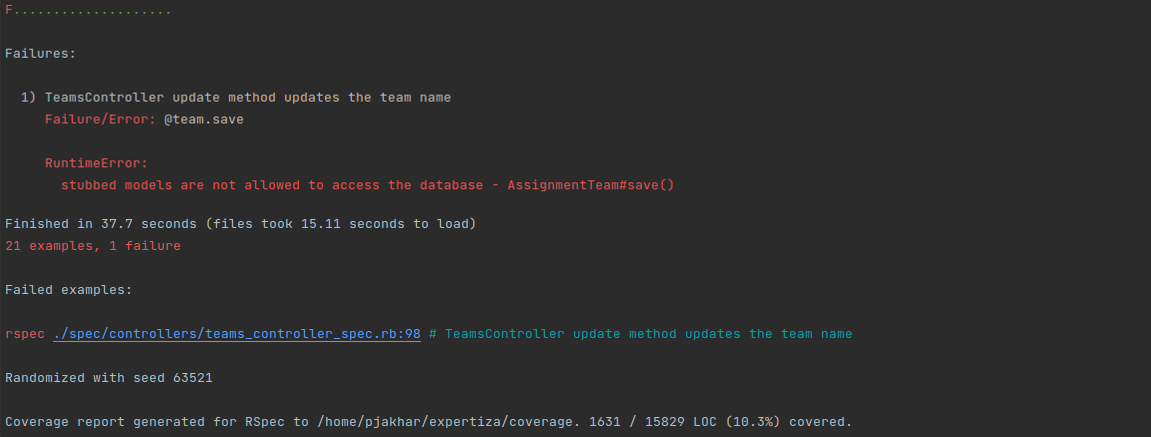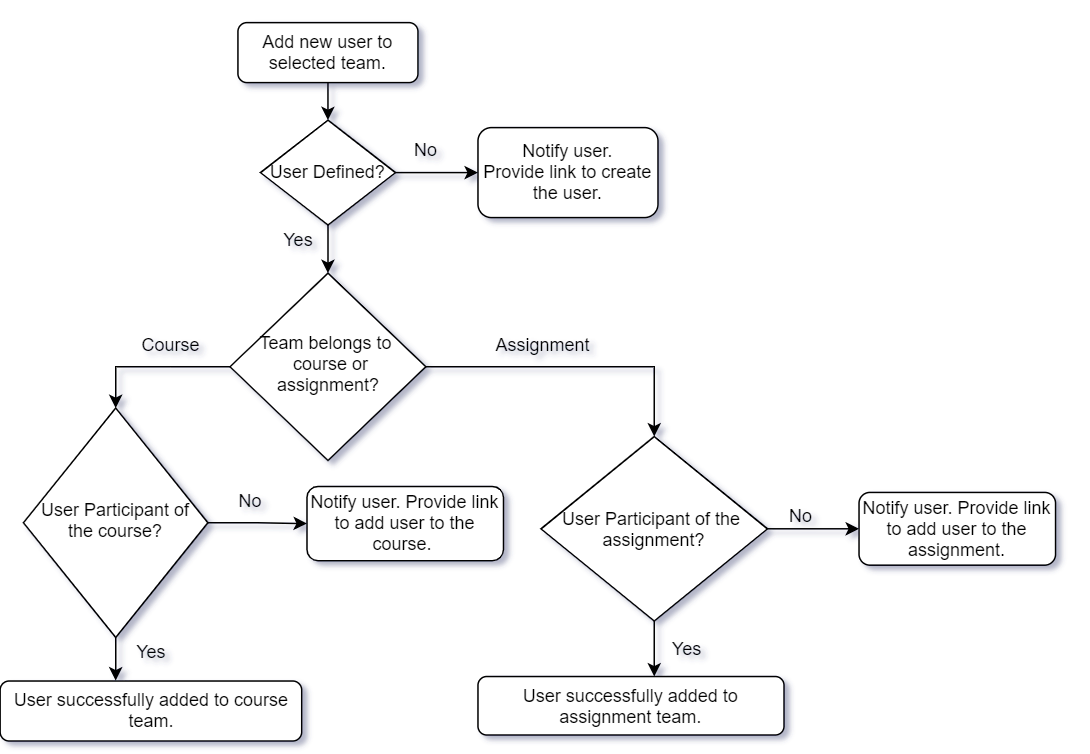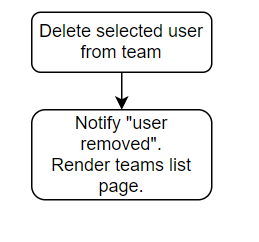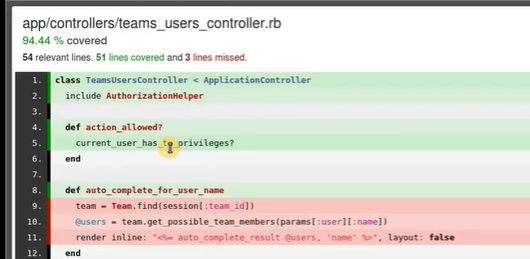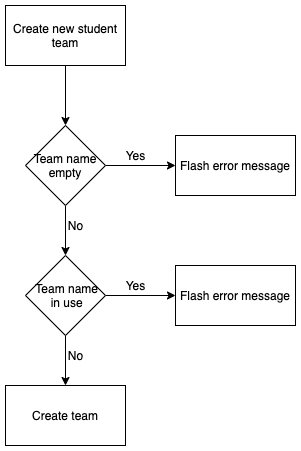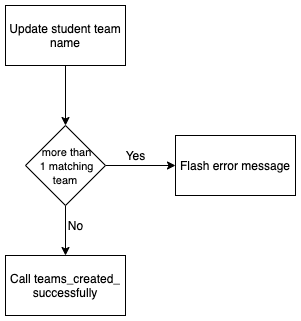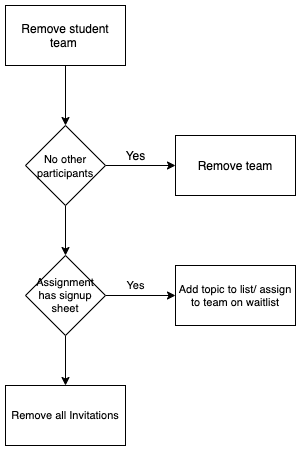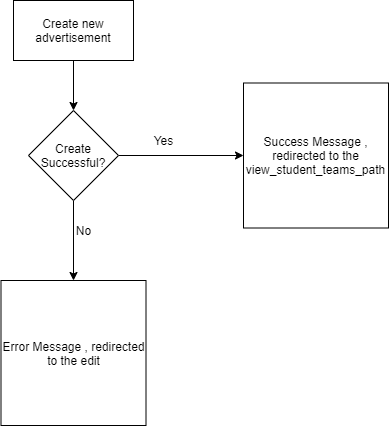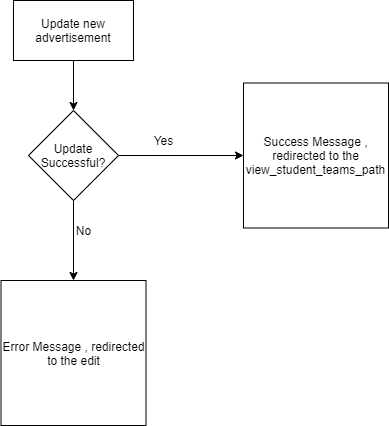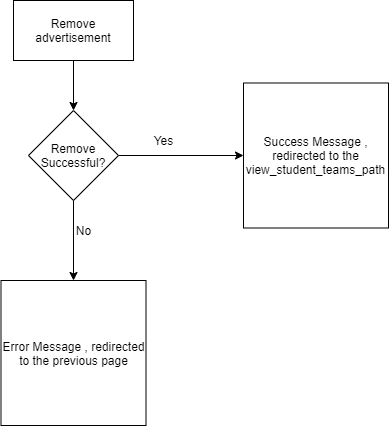CSC/ECE 517 Fall 2021 - E2167. Testing - Team Related Files: Difference between revisions
| Line 672: | Line 672: | ||
end | end | ||
end | end | ||
# | #when all the team name is set correctly, create team | ||
context "create team" do | context "create team" do | ||
it "saves the team" do | it "saves the team when all the team name is set correctly" do | ||
allow(AssignmentNode).to receive(:find_by).with(node_object_id: 1).and_return(node1) | allow(AssignmentNode).to receive(:find_by).with(node_object_id: 1).and_return(node1) | ||
allow(AssignmentTeam).to receive(:new).with(name: 'test', parent_id: 1).and_return(team7) | allow(AssignmentTeam).to receive(:new).with(name: 'test', parent_id: 1).and_return(team7) | ||
| Line 697: | Line 697: | ||
#when the team name is already in use, it flashes message | #when the team name is already in use, it flashes message | ||
context "name already in use" do | context "name already in use" do | ||
it "flash notice" do | it "flash notice when the team name is already in use" do | ||
allow(AssignmentTeam).to receive(:where).with(name: 'test', parent_id: 1).and_return(team7) | allow(AssignmentTeam).to receive(:where).with(name: 'test', parent_id: 1).and_return(team7) | ||
allow(AssignmentParticipant).to receive(:find).with('1').and_return(student1) | allow(AssignmentParticipant).to receive(:find).with('1').and_return(student1) | ||
Revision as of 04:55, 9 December 2021
Relevant links
Github Repo : Repository
About Expertiza
Expertiza is an open source project based on Ruby on Rails framework. It is a web based program that allows instructors to create and update/edit assignments/tasks, and then assigns them to students. Students then can submit, edit, and update their assignments, as well as peer review other student's assignments.
Problem statement and background
There are many files related to teams that don’t have enough tests: teams_controller, teams_users_controller, student_teams_controller, join_team_requests_controller, and advertise_for_partner_controller. They all need essentially the same kind of fixtures or mocks to enable testing: A team that is created, a couple of students that can be added to the team, an invitation that can be sent from one student to another student to join a particular team
Approach Chosen & Why?
In this project we have first identified all the set of scenarios related to team controllers. Each of the scenarios are identified as mentioned above and has been subdivided into a number of ways in which it can be realized. This will ensure that code is robust to any kind of unexpected changes and that the functionality will not be broken when deployed in production. We have chosen to bring about this robustness of test by writing unit test and functional tests using RSpec and Capybara respectively. Unit Tests will ensure that the particular functionality is being tested in a isolated setup which would even include the edge cases whereas the functional tests will ensure that this teams feature is in resonance with the other features and works coherently.
Implementation
- This controller can be found in spec/support
- It has all shared methods to be included in Teams related files.
Why this file? - There are a lot of methods common in the Teams Related Files, they basically use similar / same stubbed objects and methods. Implementing the teams_shared.rb file keeps the code DRY and makes use of good design principles.
Declared common stubbed objects
This creates single instances of superadmin, admin, instructor, teaching assistant, course and assignment. There are 2 instances of students, 5 instances of assignment teams, 2 instances of course teams, 4 instances of team join requests, and single instances of participant, node and team user.
shared_context 'object initializations' do
let(:superadmin) { build_stubbed(:superadmin) }
let(:admin) { build_stubbed(:admin) }
let(:instructor) { build_stubbed(:instructor, id: 1) }
let(:ta) { build_stubbed(:teaching_assistant) }
let(:student1) { build_stubbed(:student, id: 1, name: 'student2065') }
let(:student2) { build_stubbed(:student, id: 2) }
let(:course1) { build_stubbed(:course, name: 'TestCourse', id:1, instructor_id: instructor.id) }
let(:assignment1) { build_stubbed(:assignment, name: 'TestAssignment', id: 1) }
let(:team1) { build_stubbed(:assignment_team, id: 1, name: 'wolfers',parent_id: assignment1.id) }
let(:team2) { build_stubbed(:assignment_team, id: 2, parent_id: assignment1.id) }
let(:team3) { build_stubbed(:assignment_team, id: 3, parent_id: assignment1.id) }
let(:team4) { build_stubbed(:assignment_team, id: 4, parent_id: assignment1.id) }
let(:team5) { build_stubbed(:course_team, id: 5, parent_id: course1.id) }
let(:team6) { build_stubbed(:course_team, id: 6, parent_id: course1.id) }
let(:team7) { build_stubbed(:assignment_team, name: 'test', parent_id: course1.id) }
let(:join_team_request1) { build_stubbed(:join_team_request, id: 1, team_id: team1.id, status: 'P') }
let(:join_team_request2) { build_stubbed(:join_team_request, id: 2, team_id: team2.id, status: 'P',comments: "Any comment") }
let(:join_team_request3) { build_stubbed(:join_team_request, id: 3, team_id: team2.id, status: 'D',comments: "Updated") }
let(:invalidrequest) { build_stubbed(:join_team_request) }
let(:participant) { build_stubbed(:participant, id: 1) }
let(:node1) { build_stubbed(:assignment_node, node_object_id: 1) }
let(:team_user1) { build_stubbed(:team_user, team_id:1, user_id:1)}
The action_allowed method is there in all controllers, so a shared example was created which allows the tests to run in scope of different controllers. It contains tests for access checks for superadmin, admin, instructor and ta users. Only the authorization of student changes between the team related files so that test was not included in here.
shared_context 'authorization check', :shared_context => :metadata do # Testing to check Super Admin access it 'superadmin credentials' do stub_current_user(superadmin, superadmin.role.name, superadmin.role) expect(controller.send(:action_allowed?)).to be true end # Testing to check Admin access it 'admin credentials' do stub_current_user(admin, admin.role.name, admin.role) expect(controller.send(:action_allowed?)).to be true end # Testing to check TA access it 'ta credentials' do stub_current_user(ta, ta.role.name, ta.role) expect(controller.send(:action_allowed?)).to be true end # Testing to check Instructor access it 'instructor credentials' do stub_current_user(instructor, instructor.role.name, instructor.role) expect(controller.send(:action_allowed?)).to be true end
How to use this shared file? Add a require statement:
require './spec/support/teams_shared.rb'
Add include_context statements in the controller.
include_context "object initializations" include_context 'authorization check'
teams_controller.rb
How to run the test?
rspec spec/controllers/teams_controller_spec.rb
Scenario 1: Create teams with random names
- After checking for the team type and team size, call function to randomize the teams
- Print message "Random teams have been successfully created."
- Redirect to list of teams
describe 'create teams method' do
context 'when correct parameters are passed' do
it 'creates teams with random names' do
allow(Object).to receive_message_chain(:const_get, :find).with(any_args).and_return(assignment1)
allow(Version).to receive_message_chain(:where, :last).with(any_args).and_return(0.1)
para = {id: assignment1.id, team_size: 2}
session = {user: instructor, team_type: "Assignment"}
result = get :create_teams, para, session
expect(result.status).to eq 302
expect(result).to redirect_to(:action => 'list', :id => assignment1.id)
end
end
end
Scenario 2: List the teams assignment wise or course wise
- Check the team type passed in params to see if it is Assignment or Course type
- Get the teams belonging to that Assignment or Course and list them all
describe 'list method' do
before(:each) { allow(Assignment).to receive(:find_by).and_return(assignment1) }
context 'when type is Assignment' do
it 'lists the teams for that Assignment' do
params = {id: assignment1.id, type: 'Assignment'}
session = {user: instructor}
result = get :list, params, session
expect(result.status).to eq 200
expect(controller.instance_variable_get(:@assignment)).to eq assignment1
end
end
context 'when type is Course' do
it 'lists the teams for that Course' do
params = {id: course1.id, type: 'Course'}
session = {user: instructor}
result = get :list, params, session
expect(result.status).to eq 200
expect(controller.instance_variable_get(:@assignment)).to eq nil
end
end
context 'when type is not Assignment or Course' do
it 'throws error' do
params = {id: 52, type: 'Subject'}
session = {user: instructor}
result = get :list, params, session
expect(result.status).to eq 200
expect(controller.instance_variable_get(:@assignment)).to eq nil
end
end
end
Scenario 3: Create a new empty team
- Check if a team already exists with the same name
- If it doesn’t, create a new team with a name
- If a team is created, print "The team <team_name> has been successfully created."
- Redirect to list team page
- If error is there, fail to create a new team and redirect to new team form page
describe 'new method' do
it 'creates a new team successfully when all parameters are provided correctly' do
allow(Object).to receive_message_chain(:const_get, :find).with(any_args).and_return(assignment1)
para = {id: assignment1.id}
session = {user: ta, team_type: 'Assignment'}
result = get :new, para, session
expect(result.status).to eq 200
expect(controller.instance_variable_get(:@parent)).to eq assignment1
end
end
Scenario 4: Update an existing team
- Check if a team with new suggested name already exists
- If it doesn’t, update and save the new team name
- Print "The team <new_team_name> has been successfully updated."
- Redirect to list team page
- If error is there, fail to update team and redirect to edit team form page
describe 'update method' do
it 'updates the team name' do
allow(Team).to receive(:find).and_return(team1)
allow(Assignment).to receive(:find).and_return(assignment1)
para = { id: team1.id, team: {name: 'rando team'}}
session = {user: ta, team_type: 'Assignment'}
result = get :update, para, session
expect(result.status).to eq 302
expect(result).to redirect_to(:action => 'list', :id => assignment1.id)
end
# this test will fail even though it should normally pass, that's because it runs into an error at @team.save
# RumtimeError: stubbed models are not allowed to access the database - AssignmentTeam#save()
end
Scenario 5: Delete a team
- Check if there is a team in waitlist for the topic that the team to be deleted holds
- If there is a team on the waitlist, assign the topic to that team. If multiple teams are there, assign the topic to the first team in the waitlist.
- Delete the team’s records in team, teams_users and sign_up_team tables
- Print “"The team <team_name> has been successfully deleted."
describe 'delete method' do
before(:each) { request.env['HTTP_REFERER'] = root_url }
context 'when called and team is nil' do
it 'simply redirects back to the earlier page' do
allow(Team).to receive(:find_by).and_return(nil)
para = {id: 5}
session = {user: instructor}
result = get :delete, para, session
expect(result.status).to eq 302
expect(result).to redirect_to :back
expect(controller.instance_variable_get(:@team)).to eq nil
end
end
context 'when called and team is not nil and it does not hold a topic' do
it 'deletes the team' do
allow(Team).to receive(:find_by).and_return(team5)
allow(Object).to receive_message_chain(:const_get, :find).and_return(course1)
allow(team5).to receive(:destroy).and_return(nil)
para = {id: 5}
session = {user: instructor, team_type: 'CourseTeam'}
result = get :delete, para, session
expect(result.status).to eq 302
expect(controller.instance_variable_get(:@team)).to eq team5
end
end
end
Scenario 6: Copy existing teams from a course down to an assignment
- Find the course that the assignment belongs to
- If a course for the assignment doesn’t exist, give the error message "No course was found for this assignment."
- Otherwise fetch all the teams that exist in the course
- If no teams exist, give the error message "No teams were found when trying to inherit."
- Else copy all teams and assign them the new assignment id
describe 'inherit method' do
context 'called when assignment belongs to course and team is not empty' do
it 'copies teams from course to the assignment' do
allow(Assignment).to receive(:find).and_return(assignment1)
allow(Course).to receive(:find).and_return(course1)
allow(course1).to receive(:get_teams).and_return([team5, team6])
para = {id: team5.id}
session = {user: ta}
result = get :inherit, para, session
expect(result.status).to eq 302
expect(result).to redirect_to(:controller => 'teams', :action => 'list', :id => assignment1.id)
end
end
context 'called when assignment belongs to course but team is empty' do
it 'flashes note' do
allow(Assignment).to receive(:find).and_return(assignment1)
allow(Course).to receive(:find).and_return(course1)
para = {id: team5.id}
session = {user: ta}
result = get :inherit, para, session
expect(result.status).to eq 302
expect(result).to redirect_to(:controller => 'teams', :action => 'list', :id => assignment1.id)
end
end
context 'called when assignment belongs to no course' do
let(:fasg) { build_stubbed(:assignment, id: 1074, course_id: -2) }
# a temporary assigment object is created with an abnormal course_id so that we can check the fail condition of the method
it 'flashes error' do
allow(Assignment).to receive(:find).and_return(fasg)
allow(Course).to receive(:find).and_return(course1)
para = {id: team5.id}
session = {user: ta}
result = get :inherit, para, session
expect(result.status).to eq 302
expect(result).to redirect_to(:controller => 'teams', :action => 'list', :id => fasg.id)
end
end
end
Scenario 7: Copy existing team from assignment to course
- Find the assignment id to which the team belongs
- Find the course to which the assignment belongs
- If assignment doesn’t belong to a course, give the error message "This assignment is not <assignment_name> with a course."
- Otherwise copy team from assignment and assign it the course id
- Print success message "The team <team_name> was successfully copied to <course_name>"
- Redirect to list page
describe 'bequeath method' do
context 'called when assignment has a course' do
it 'copies the teams from assignment to the course' do
allow(AssignmentTeam).to receive(:find).and_return(team2)
allow(Assignment).to receive(:find).and_return(assignment1)
allow(Course).to receive(:find).and_return(course1)
para = {id: team2.id}
session = {user: ta}
result = get :bequeath, para, session
expect(result.status).to eq 302
expect(result).to redirect_to(:controller => 'teams', :action => 'list', :id => assignment1.id)
end
end
context 'called when assignment does not have a course' do
let(:fasg) { build_stubbed(:assignment, id: 1074, course_id: -2) }
# a temporary assigment object is created with an abnormal course_id so that we can check the fail condition of the method
it 'throws an error and fails to copy the teams' do
allow(AssignmentTeam).to receive(:find).and_return(team2)
allow(Assignment).to receive(:find).and_return(fasg)
para = {id: team2.id}
session = {user: ta}
result = get :bequeath, para, session
expect(result.status).to eq 302
expect(result).to redirect_to(:controller => 'teams', :action => 'list', :id => fasg.id)
end
end
end
Scenario 8: Edit method
- Find the team with the 'id' present in params
describe 'edit method' do
it 'successfully returns the team with the given team id' do
allow(Team).to receive(:find).and_return(team1)
para = {id: team1.id}
session = {user: ta}
result = get :edit, para, session
expect(result.status).to eq 200
expect(controller.instance_variable_get(:@team)).to eq team1
end
# this method has only 1 line which is just to look up a team with the id present in the params
end
Scenario 9: Create an empty team
- Find the parent (Assignment or Course) based on the team type which starts the session
- It checks whether a team with the same exists in that category
- If team exists, it throws TeamExistsError and redirects to 'new' team form page
- If team doesn't exist, it creates a new team
- Successful message is displayed and user is redirected to 'list' teams page
describe 'create method' do
context 'when invoked with a team which does not exist' do
it 'creates it' do
allow(Assignment).to receive(:find).and_return(assignment1)
para = { id: assignment1.id, team: {name: 'rando team'}}
session = {user: ta, team_type: 'Assignment'}
result = get :create, para, session
expect(result.status).to eq 302
expect(result).to redirect_to(:action => 'list', :id => assignment1.id)
end
end
end
Test Pass/ Fail
Coverage
teams_users_controller.rb
Code correction in teams_users_controller.rb in list method: Team users list users page was not displaying users as expected and showed error for accessing @team.assignment_id. The error is rectified and corrected.
def list @team = Team.find(params[:id]) @assignment = Assignment.find(@team.parent_id) @teams_users = TeamsUser.page(params[:page]).per_page(10).where(["team_id = ?", params[:id]]) end
The above code is corrected to following:
def list @team = Team.find(params[:id]) @assignment = Assignment.find(@team.parent_id) @teams_users = TeamsUser.page(params[:page]).per_page(10).where(["team_id = ?", params[:id]]) end
How to run the test?
rspec spec/controllers/teams_users_controller_spec.rb
Scenario 1: List users under the team
- When list icon against a course or assignment team is selected
- Render list of users under selected team.
#Test team users list functionality
describe '#list' do
context 'when list is clicked' do
it 'renders list of users under Assignment team teams#users' do
allow(Team).to receive(:find).with('1').and_return(team1)
allow(Assignment).to receive(:find).with(1).and_return(assignment1)
@params = {id:1}
session = {user: instructor}
get :list, @params, session
expect(response).to render_template(:list)
end
end
end
Scenario 2: New user under the course or assignment team
- Sets the instance variable to team object
#Test team users controller new method
describe '#new' do
it ' sets the instance variable to team object' do
allow(Team).to receive(:find).with('1').and_return(team1)
params = {id: 1}
session = {user: instructor}
get :new, params, session
expect(controller.instance_variable_get(:@team)).to eq(team1)
end
end
Scenario 3: Create: Add new user to the selected team.
- Given user is not defined: When given user is defined, link is provided to create the user.
- Selected team to which user is being added belongs to an assignment: When user is not a participant of the assignment, link is provided to add the user to the assignment. When the assignment team already has maximum number of users, "Maximum users reached" notification is flashed.
- Selected team to which user is being added belongs to a course: When user is not a participant of the course, link is provided to add the user to the course. When the course team already has maximum number of users, "Maximum users reached" notification is flashed.
- Response is redirected to 'http://test.host/teams/list?id=1'.
#Test adding new user to assignment or course team
describe '#create' do
context 'when user is added to assignment or course team' do
it 'it throws error when user is not defined' do
allow(User).to receive(:find_by).with(name: 'instructor6').and_return(nil)
allow(Team).to receive(:find).with('1').and_return(team1)
session = {user: admin}
params = {
user: {name: 'instructor6'}, id: 1
}
post :create, params, session
expect(flash[:error]).to eq "\"instructor6\" is not defined. Please <a href=\"http://test.host/users/new\">create</a> this user before continuing."
expect(response).to redirect_to('http://test.host/teams/list?id=1')
end
end
context 'when user is added to assignment team' do
it 'it throws error when user added is not a participant of the current assignment' do
allow(User).to receive(:find_by).with(name: student1.name).and_return(student1)
allow(Team).to receive(:find).with('1').and_return(team1)
allow(AssignmentTeam).to receive(:find).with('1').and_return(team1)
allow(Assignment).to receive(:find).with(1).and_return(assignment1)
allow(AssignmentParticipant).to receive(:find_by).with(user_id: 1, parent_id: 1).and_return(nil)
session = {user: admin}
params = {
user: {name: 'student2065'}, id: 1
}
post :create, params, session
expect(flash[:error]).to eq "\"student2065\" is not a participant of the current assignment. Please <a href=\"http://test.host/participants/list?authorization=participant&id=1&model=Assignment\">add</a> this user before continuing."
expect(response).to redirect_to('http://test.host/teams/list?id=1')
end
end
context 'when user is added to assignment team' do
it 'it throws error when assignmentTeam has maximum number of participants' do
allow(User).to receive(:find_by).with(name: student1.name).and_return(student1)
allow(Team).to receive(:find).with('1').and_return(team1)
allow(AssignmentTeam).to receive(:find).with('1').and_return(team1)
allow(Assignment).to receive(:find).with(1).and_return(assignment1)
allow(AssignmentParticipant).to receive(:find_by).with(user_id: 1, parent_id: 1).and_return(participant)
allow_any_instance_of(Team).to receive(:add_member).with(any_args).and_return(false)
session = {user: admin}
params = {
user: {name: 'student2065'}, id: 1
}
post :create, params, session
expect(flash[:error]).to eq "This team already has the maximum number of members."
expect(response).to redirect_to('http://test.host/teams/list?id=1')
end
end
context 'when user is added to assignment team' do
it 'new user gets successfully added to the assignment' do
allow(User).to receive(:find_by).with(name: student1.name).and_return(student1)
allow(Team).to receive(:find).with(any_args).and_return(team1)
allow(AssignmentTeam).to receive(:find).with('1').and_return(team1)
allow(Assignment).to receive(:find).with(1).and_return(assignment1)
allow(AssignmentParticipant).to receive(:find_by).with(user_id: 1, parent_id: 1).and_return(participant)
allow_any_instance_of(Team).to receive(:add_member).with(any_args).and_return(true)
allow(TeamsUser).to receive(:last).with(any_args).and_return(student1)
session = {user: admin}
params = {
user: {name: 'student2065'}, id: 1
}
post :create, params, session
expect(response).to redirect_to('http://test.host/teams/list?id=1')
end
end
context 'when user is added to course team' do
it 'it throws error when user added to course Team is not defined' do
allow(User).to receive(:find_by).with(name: student1.name).and_return(student1)
allow(Team).to receive(:find).with('5').and_return(team5)
allow(CourseTeam).to receive(:find).with('5').and_return(team5)
allow(Course).to receive(:find).with(1).and_return(course1)
allow(CourseParticipant).to receive(:find_by).with(user_id: 1, parent_id: 1).and_return(nil)
session = {user: admin}
params = {
user: {name: 'student2065'}, id: 5
}
post :create, params, session
expect(flash[:error]).to eq "\"student2065\" is not a participant of the current course. Please <a href=\"http://test.host/participants/list?authorization=participant&id=1&model=Course\">add</a> this user before continuing."
expect(response).to redirect_to('http://test.host/teams/list?id=1')
end
end
context 'when user is added to course team' do
it 'it throws error when courseTeam has maximum number of participants' do
allow(User).to receive(:find_by).with(name: student1.name).and_return(student1)
allow(Team).to receive(:find).with('5').and_return(team5)
allow(CourseTeam).to receive(:find).with('5').and_return(team5)
allow(Course).to receive(:find).with(1).and_return(course1)
allow(CourseParticipant).to receive(:find_by).with(user_id: 1, parent_id: 1).and_return(participant)
allow_any_instance_of(CourseTeam).to receive(:add_member).with(any_args).and_return(false)
session = {user: admin}
params = {
user: {name: 'student2065'}, id: 5
}
post :create, params, session
expect(flash[:error]).to eq "This team already has the maximum number of members."
expect(response).to redirect_to('http://test.host/teams/list?id=1')
end
end
context 'when user is added to course team' do
it 'new user gets successfully added to course' do
allow(User).to receive(:find_by).with(name: student1.name).and_return(student1)
allow(Team).to receive(:find).with('5').and_return(team5)
allow(CourseTeam).to receive(:find).with('5').and_return(team5)
allow(TeamsUser).to receive(:create).with(user_id: 1, team_id: 5).and_return(double('TeamsUser', id: 1))
allow(TeamNode).to receive(:find_by).with(node_object_id: 5).and_return(double('TeamNode', id: 1))
allow(TeamUserNode).to receive(:create).with(parent_id: 1, node_object_id: 1).and_return(double('TeamUserNode', id: 1))
allow(Course).to receive(:find).with(1).and_return(course1)
allow(CourseParticipant).to receive(:find_by).with(user_id: 1, parent_id: 1).and_return(participant)
allow_any_instance_of(CourseTeam).to receive(:add_member).with(any_args).and_return(true)
session = {user: admin}
params = {
user: {name: 'student2065'}, id: 5
}
post :create, params, session
expect(response).to redirect_to('http://test.host/teams/list?id=1')
end
end
end
Scenario 4: Delete user from the selected team.
- User under assignment or course team is deleted: user association to the respective team is deleted and hence user is no longer part of the team.
#Test delete user from team
describe '#delete' do
context 'when user is deleted' do
it 'it deletes the user and redirects to Teams#list page' do
allow(TeamsUser).to receive(:find).with("1").and_return(teamUser)
allow(Team).to receive(:find).with(teamUser.team_id).and_return(team1)
allow(User).to receive(:find).with(teamUser.user_id).and_return(student1)
@params = {id:1}
session = {user: instructor}
post :delete, @params, session
expect(response).to redirect_to('http://test.host/teams/list?id=1')
end
end
end
Scenario 5: Delete selected users from the selected team.
- Selected users under assignment or course team is deleted: for each user in the selected users, association to the respective team is deleted and hence user is no longer part of the team.
- Response is redirected to 'http://test.host/teams/list'.
#Test delete selected users from team
describe '#delete_selected' do
context 'when selected users are deleted' do
it 'it deletes the selected users and redirects to Teams#list page' do
allow(TeamsUser).to receive(:find).with("1").and_return([teamUser])
allow(TeamsUser).to receive(:find).with("2").and_return([teamUser2])
@params = {item:[1,2]}
session = {user: instructor}
post :delete_selected, @params, session
expect(response).to redirect_to('http://test.host/teams_users/list')
end
end
end
Test Pass/ Fail
Coverage
student_teams_controller.rb
Scenario 1: Set the variables for view
- If the current user is student and their User Ids match, then the following values are set: @send_invs, @received_invs, @current_due_date, @users_on_waiting_list, @teammate_review_allowed
- If the current user is not student or the User Ids do not match, then the return from method.
describe '#view' do
it 'sets the student' do
allow(AssignmentParticipant).to receive(:find).with('12345').and_return student
allow(student_teams_controller).to receive(:current_user_id?)
allow(student_teams_controller).to receive(:params).and_return(student_id: '12345')
allow(student).to receive(:user_id)
student_teams_controller.view
end
end
Scenario 2: Create Student teams
- If team name is empty, flash an error message saying "Team name missing while creating team" and redirect to view_student_teams_path
- If team name is not empty and team name already in use, "Team name being created was already in use" and redirect to view_student_teams_path
- If team name is not empty and team name not in use, save team data, add logged in student to team and redirect to view_student_teams_path.
describe 'POST #create' do
#before(:each) do
# @student = AssignmentParticipant.new
#end
# When assignment team is empty it flashes a notice
context 'when create Assignment team' do
it 'flash notice when team is empty' do
allow(AssignmentTeam).to receive(:where).with(name: , parent_id: 1).and_return([])
allow(AssignmentParticipant).to receive(:find).with('1').and_return(student1)
allow(AuthorizationHelper).to receive(:current_user_has_id).with(any_args).and_return(true)
allow(student1).to receive(:user_id).with(any_args).and_return(1)
session = {user:student1}
params = {
student_id:1,
team:{
name:
},
action: 'create'
}
result= post :create, params, session
expect(result.status).to eq 302
end
end
#when all the team name is set correctly, create team
context "create team" do
it "saves the team when all the team name is set correctly" do
allow(AssignmentNode).to receive(:find_by).with(node_object_id: 1).and_return(node1)
allow(AssignmentTeam).to receive(:new).with(name: 'test', parent_id: 1).and_return(team7)
allow(AssignmentParticipant).to receive(:find).with('1').and_return(student1)
allow(AuthorizationHelper).to receive(:current_user_has_id).with(any_args).and_return(true)
allow(User).to receive(:find).with(1).and_return(team_user1)
allow_any_instance_of(Team).to receive(:add_member).with(any_args).and_return(true)
allow(student1).to receive(:user_id).with(any_args).and_return(1)
allow(team7).to receive(:save).and_return(true)
session = {user:student1}
params = {
student_id:1,
team:{
name:'test'
},
action: 'create'
}
result= post :create, params, session
expect(result.status).to eq(302)
end
end
#when the team name is already in use, it flashes message
context "name already in use" do
it "flash notice when the team name is already in use" do
allow(AssignmentTeam).to receive(:where).with(name: 'test', parent_id: 1).and_return(team7)
allow(AssignmentParticipant).to receive(:find).with('1').and_return(student1)
allow(AuthorizationHelper).to receive(:current_user_has_id).with(any_args).and_return(true)
allow(student1).to receive(:user_id).with(any_args).and_return(1)
allow(team7).to receive(:empty?).and_return(false)
session = {user:student1}
params = {
student_id:1,
team:{
name:'test'
},
action: 'create'
}
result= post :create, params, session
expect(result.status).to eq 302
end
end
end
Scenario 3: Update team name:
- Find the team that should be updated.
- If there are no matching teams, call team_created_successfully and redirect to view_student_teams_path
- If there is exactly one match, then call team_created_successfully and redirect to view_student_teams_path
- If there are more than one team, then show the following error message "Team name being updated to was already in use" and redirect to edit_student_teams_path.
describe '#update' do
#When the name is not already present it updates the name
context 'update team name when matching name not found' do
it 'update name' do
allow(AssignmentTeam).to receive(:where).with(name: 'test', parent_id: 1).and_return([])
allow(Team).to receive(:find).with("1").and_return(team7)
allow(AssignmentParticipant).to receive(:find).with('1').and_return(student1)
allow(AuthorizationHelper).to receive(:current_user_has_id).with(any_args).and_return(true)
allow(student1).to receive(:user_id).with(any_args).and_return(1)
allow(team7).to receive(:user_id).with(any_args).and_return(1)
allow(team7).to receive(:update_attribute).and_return(true)
session = {user:student1}
params = {
student_id:1,
team_id:1,
team:{
name:'test'
},
action: 'update'
}
result= post :update, params, session
expect(result.status).to eq(302)
end
end
#When no team has name and only one matching team is found,update the name
context 'update name when name is found' do
it 'update name' do
allow(AssignmentTeam).to receive(:where).with(name: 'test', parent_id: 1).and_return(team1)
allow(Team).to receive(:find).with("1").and_return(team8)
allow(AssignmentParticipant).to receive(:find).with('1').and_return(student1)
allow(AuthorizationHelper).to receive(:current_user_has_id).with(any_args).and_return(true)
allow(student1).to receive(:user_id).with(any_args).and_return(1)
allow(team8).to receive(:user_id).with(any_args).and_return(1)
allow(team8).to receive(:update_attribute).and_return(true)
allow(team1).to receive(:length).and_return(1)
allow(team1).to receive(:name).and_return("test")
allow(team8).to receive(:name).and_return("test")
session = {user:student1}
params = {
student_id:1,
team_id:1,
team:{
name:'test'
},
action: 'update'
}
result= post :update, params, session
expect(result.status).to eq(302)
end
end
#when the team name is already in use, then flash the error message
context 'name is already in use' do
it 'flash notice' do
allow(AssignmentTeam).to receive(:where).with(name: 'test', parent_id: 1).and_return(team1)
allow(Team).to receive(:find).with("1").and_return(team8)
allow(AssignmentParticipant).to receive(:find).with('1').and_return(student1)
allow(AuthorizationHelper).to receive(:current_user_has_id).with(any_args).and_return(true)
allow(student1).to receive(:user_id).with(any_args).and_return(1)
allow(team8).to receive(:user_id).with(any_args).and_return(1)
allow(team1).to receive(:length).and_return(2)
session = {user:student1}
params = {
student_id:1,
team_id:1,
team:{
name:'test'
},
action: 'update'
}
result= post :update, params, session
expect(result.status).to eq(302)
end
end
end
Scenario 4: Remove team participants
- Find the user who has to be removed.
- Remove the user from team.
- If the team does not have any more participants, remove the team record from database.
- If the assignment has sign up sheet, then add the topic back to topics pool or assign the topic to a new team from waitlist
- Remove all the invitations sent and redirect to view_student_teams_path.
describe '#remove_participant' do
#remove participant from team and remove team if he was the only particilant
context 'remove team user' do
it 'remove user' do
allow(AssignmentParticipant).to receive(:find).and_return(participant)
allow(TeamsUser).to receive(:where).and_return(team_user1)
allow(team_user1).to receive(:destroy_all)
allow(team_user1).to receive_message_chain(:where,:empty?).and_return(false)
allow_any_instance_of(AssignmentParticipant).to receive(:save).and_return(false)
session = {user:student1}
params = {
team_id:1,
user_id:1,
student_id:1,
team:{
name:'test'
}
}
result = post :remove_participant, params, session
expect(result.status).to eq 302
# expect(result).to redirect_to(view_student_teams_path(:student_id => 1))
end
end
end
Test Pass/ Fail
Coverage
join_team_requests_controller.rb
P = Pending status, D = Denied status, A = Accepted status. To test the controller, run the line:
rspec spec/controllers/join_team_request_controller_spec.rb
Scenario 1: Creating a team request
- If the team id is verified along with user id and assignment id, create a new request and change @join_team_request = 'P' .
- If error occurs, flash error message.
describe "POST #create" do
before(:each) do
# Stubbing participant to receive an object with id = 1
allow(Participant).to receive(:find).with("1").and_return(participant)
end
context "when resource is not saved!" do
it "renders new page" do
allow(JoinTeamRequest).to receive(:new).and_return(invalidrequest)
params = {participant_id: participant.id, team_id: -2}
session = {user: student1}
get :new, params, session
expect(response).to render_template("new")
end
end
# Testing when the object is being saved to the database
context "when resource is saved" do
before(:each) do
allow(JoinTeamRequest).to receive(:new).and_return(join_team_request2)
allow(Team).to receive(:find).with("1").and_return(team1)
allow(Assignment).to receive(:find).with(1).and_return(assignment1)
allow(Participant).to receive(:where).with(user_id: 1,parent_id: '1').and_return([participant])
allow(join_team_request2).to receive(:save).and_return(true)
end
it "valid response" do
allow(join_team_request2).to receive(:save).and_return(true)
params = {
id: 2,
join_team_request2: {
status: 'P'
},
team_id: 1,
assignment_id: 1
}
session = {user: student1}
post :create, params, session
expect(response.status).to eq 302
expect(join_team_request2.status).to eq('P')
end
end
context "when it is not created" do
it "will page for new " do
allow(join_team_request2).to receive(:save).and_return(false)
params = {action: 'new'}
session = {user: student1}
get :new, params, session
expect(response.status).to eq 200
end
end
end
Scenario 2: Decline a team request.
- After verifying team_user_id, change @join_team_request.status = 'D' .
- Redirect to view_student_teams_path
describe "#decline" do
context "when join team request is declined" do
before(:each) do
allow(JoinTeamRequest).to receive(:find).and_return(join_team_request2)
allow(join_team_request2).to receive(:save).and_return(true)
end
it "will change status to 'D'" do
params = {action: 'decline'}
session = {user: ta}
result = get :decline, params, session
expect(result.status).to eq 302
end
it "will redirect to view student teams path" do
params = {action: 'decline'}
session = {user: ta}
result = get :decline, params, session
expect(result).to redirect_to(view_student_teams_path)
end
end
end
Scenario 3: Check team status.
- Since this method is private there is no test case written for it.
- If team if full. Print error message "This team is full." .
- If team is not empty, print message "You are already a member of this team."
Test Pass/ Fail
All tests, except 1 pass. The test that fails is for the "get index" method. We have identified that there is no route the view/index is going to.
def respond_after(request)
respond_to do |format|
format.html
format.xml { render xml: request }
end
end
Coverage
advertise_partner_controller.rb
Scenario 1: Creating new advertisement for partners.
- We set the advertise_for_partner : True, comments_for_advertisement[param] when the user wants to set a new advertisement for partners in AssignmentTeam mode.
describe "POST #create" do
context "when it is valid" do
it "will create an advertisement" do
allow(AssignmentTeam).to receive(:find_by).and_return(team1)
allow(AssignmentParticipant).to receive(:exists?).and_return(true)
allow(team1).to receive(:assignment).and_return(assignment1)
allow(team1).to receive(:update_attributes).and_return(true)
allow(AssignmentParticipant).to receive(:find_by).and_return(participant)
params = {
id: team1.id,
team_id: team1.id,
}
session = {user: ta}
result = get :create, params, session
expect(result.status).to eq 302
expect(result).to redirect_to(view_student_teams_path(:student_id => 1))
end
end
end
Scenario 2: Updating the advertisement.
- We set the comments_for_advertisement[param] when the user wants to set a new advertisement for partners in AssignmentTeam model.
- Update Unsuccessful: If there is an error during update then the following error message is thrown "An error occurred, and your advertisement was not updated." and edit page is rendered.
- Update Successful: If the advertisement is successfully updated in the database, then the "Your advertisement was successfully updated!" message is prompted and the user is redirected to the view_student_teams_path.
context "when advertisement is updated" do
it "the advertisement is updated" do
allow(AssignmentTeam).to receive(:find_by).and_return(team1)
allow(AssignmentParticipant).to receive(:exists?).and_return(true)
allow(team1).to receive(:assignment).and_return(assignment1)
allow(team1).to receive(:update_attributes).and_return(true)
allow(AssignmentParticipant).to receive(:find_by).and_return(participant)
params = {
id: team1.id,
team_id: team1.id,
}
session = {user: ta}
result = get :update, params, session
expect(result.status).to eq 302
expect(result).to redirect_to(view_student_teams_path(:student_id => 1))
end
it "the advertisement is not updated due to error" do
allow(AssignmentTeam).to receive(:find_by).and_return(team1)
allow(AssignmentParticipant).to receive(:exists?).and_return(true)
allow(team1).to receive(:assignment).and_return(assignment1)
allow(AssignmentParticipant).to receive(:find_by).and_return(participant)
allow(team1).to receive(:update_attributes).and_raise(StandardError)
params = {
id: team1.id,
team_id: team1.id,
}
session = {user: ta}
result = get :update, params, session
expect(flash[:error]).to eq "An error occurred and your advertisement was not updated!"
expect(result.status).to eq 200
end
end
end
Scenario 3: Remove the advertisement.
- We set the advertise_for_partner : False , comments_for_advertisement : nil when the user wants to set a new advertisement for partners in AssignmentTeam model.
- Remove Unsuccessful : If there is an error during removing the advertisement then the following error message is thrown "An error occurred and your advertisement was not removed." and the previous page is rendered.
- Remove Successful : If the advertisement is successfully removed in the database then the "Your advertisement was successfully removed!" message is prompted and the user is redirected to the view_student_teams_path.
describe "POST #remove" do
context "when advertisement is removed" do
it "the advertisement is removed" do
allow(AssignmentTeam).to receive(:find_by).and_return(team1)
allow(AssignmentParticipant).to receive(:exists?).and_return(true)
allow(team1).to receive(:assignment).and_return(assignment1)
allow(team1).to receive(:update_attributes).and_return(true)
allow(AssignmentParticipant).to receive(:find_by).and_return(participant)
params = {
id: team1.id,
team_id: team1.id,
}
session = {user: ta}
result = get :remove, params, session
expect(result.status).to eq 302
expect(result).to redirect_to(view_student_teams_path(:student_id => 1))
end
it "the advertisement is not removed due to error" do
allow(AssignmentTeam).to receive(:find_by).and_return(team1)
allow(AssignmentParticipant).to receive(:exists?).and_return(true)
allow(team1).to receive(:assignment).and_return(assignment1)
allow(AssignmentParticipant).to receive(:find_by).and_return(participant)
allow(team1).to receive(:update_attributes).and_raise(StandardError)
params = {
id: team1.id,
team_id: team1.id,
}
session = {user: ta}
result = get :remove, params, session
expect(flash[:error]).to eq "An error occurred and your advertisement was not removed!"
expect(result).to redirect_to(request.env['HTTP_REFERER'] ? :back : (:root))
end
end
end
Test Pass/Fail
Coverage
Old Page Link
We have created a new page due to a title error at the new one. Link to the old page: https://expertiza.csc.ncsu.edu/index.php/CSC/ECE_517_Fall_2021_-_E2126._Testing_-_Team_Related_Files#Description_about_project
Github Coverage
Our Team
Yi Qiu (mentor)
Aaron Mathew (asmathew@ncsu.edu)
Priya Jakhar (pjakhar@ncsu.edu)
Supriya Krishna (sbkrishn@ncsu.edu)
Snehapriyaa Mathiyalaghan (smathiy@ncsu.edu)
